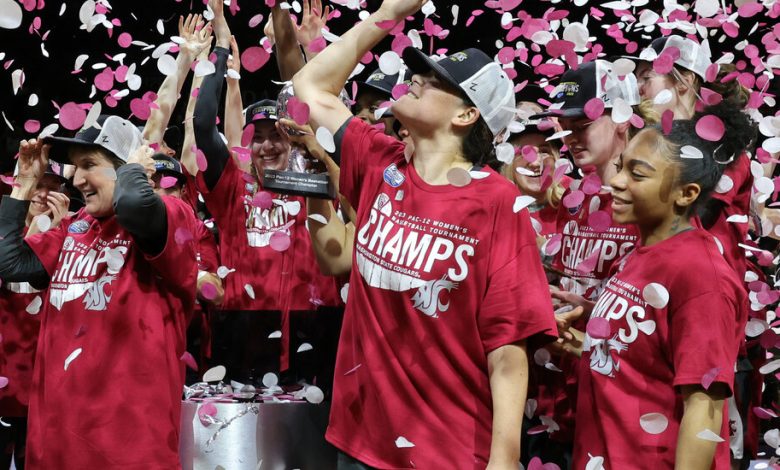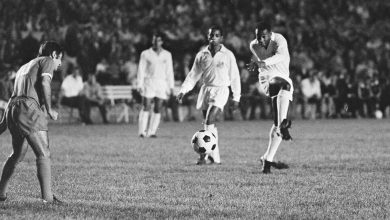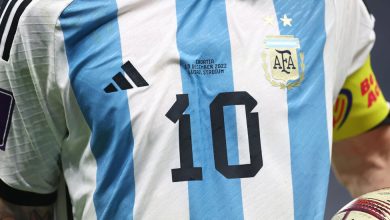A Deep Pac-12 May Soon Have a Sea Change

LAS VEGAS — When Ula Motuga, standing atop a ladder, clipped a strand of the net and raised her arms triumphantly overhead, of course she was admiring the view of her Washington State teammates, coaches and family members on the confetti-covered court below.
But it was hard for her not to gaze even farther into the distance — to a point five years ago, when she traveled halfway around the world from her home near Brisbane, Australia, to the Palouse region of southeast Washington, on little more than a vision.
“It’d be lying if I told you I’d imagined this,” Motuga said, gesturing to the scene after Washington State’s 65-61 victory over U.C.L.A. in the Pac-12 Conference tournament final to clinch the first league title for any Washington State women’s team.
But here the Cougars were, carried by the vision that Coach Kamie Ethridge laid out and led on Sunday by Charlisse Leger-Walker, their maestro of a point guard. Leger-Walker earned the tournament’s most outstanding player award after a final in which she had 23 points, 7 rebounds, 3 assists and innumerable moments when she bent the game to her will.
In their run to the championship game, which included knocking off second-seeded Utah in the quarterfinals and staving off third-seeded Colorado in the semifinals, the Cougars hardly looked the part of the seventh seed.
Except that this is the Pac-12, which may not have South Carolina (the unbeaten reigning Division I champion) or Connecticut (and all those national championships), but can confidently plant its flag as the most formidable women’s basketball conference in the country.
Pac-12 teams were 115-20 in nonconference games this season, their 85.2 winning percentage the best of any conference since 2011-12, excluding the pandemic-affected 2020-21 season. That résumé has Oregon, which limped to a 17-14 finish, holding out hope that it will be selected for the N.C.A.A. tournament despite being the ninth seed in the conference tournament.
After Washington State beat Colorado on Friday night to set up a final between the fifth and seventh seeds, Buffaloes Coach JR Payne noted: “It’s not just, ‘Whoa, one team played out of their mind and upset somebody.’ They were the two best teams this weekend.”
That would not have been the case a decade ago.
Stanford owned the Pac-12 much the way Connecticut dominated the Big East, Baylor ruled the Big 12 Conference and Tennessee reigned in the Southeastern Conference — with only occasional resistance. “The joke was it was Stanford and the 11 dwarfs,” said U.C.L.A. Coach Cori Close, whose team rallied from a 16-point deficit to upset the Cardinal in the semifinals.
Stanford Coach Tara VanDerveer, though, told the other coaches in the conference it did not have to be this way. She encouraged them to schedule strategically, to refrain from being negative when recruiting against one another, and to use their platforms to promote players around the league, not just the ones on their own team.
“Everybody had to be willing to say we’re last in the Power 5, we have to take off our institutional hats and do this thing together,” Close said.
Since then, Stanford has reasserted itself among the nation’s elite, and others have intermittently joined the Cardinal. Stanford won the national championship two years ago, beating another Pac-12 school, Arizona, in the title game. Oregon, Oregon State, Washington and California have also reached Final Fours since 2013.
Utah, which ended the regular season ranked third in The Associated Press poll and earned a share of the regular-season conference title, is capable of reaching the Final Four.
The coaches’ bonhomie has remained mostly intact even in the transfer portal era, where players can bounce from school to school, even in the same conference. Ten players transferred within the Pac-12 after last season. Included in that number is Utah forward Alissa Pili, who has blossomed after into a national player of the year candidate after transferring from Southern California.
“Any time you have the dynamics that are the overflow of the transfer portal, you have to deal with that stuff,” said Theresa Gould, the Pac-12 deputy commissioner who oversees women’s basketball. “But it hasn’t impacted our ability to band together when we need to be strategic.”
This is a moment of flux, though, for women’s basketball in the conference.
U.C.L.A. and U.S.C. will be leaving for the Big Ten after next season, and Sunday’s championship also marked the final year of the Pac-12’s contract with MGM, which has hosted the tournament since 2019. Gould said the conference is considering remaining in Las Vegas, but it is also looking at other cities within the Pac-12’s geographic footprint. “We’ve had an amazing run here,” Gould said. “Coaches love being here. But we owe it to ourselves with the growth of our product.”
Also, the future of the Pac-12 Network is uncertain.
While the network has been pilloried as a financial boondoggle, it has been a boon for exposure, with six regional feeds, one national feed and an international feed available on YouTube, ensuring that recruits — and tournament selection committee members — can get thorough looks at the product.
But with the Pac-12 nearing a new television contract — Commissioner George Kliavkoff said Friday that he expects to have it finalized in several weeks — the future of the network is up in the air. While football drives television deals, Gould said it was not necessary to “protect” women’s basketball because it is increasingly viewed as an asset.
Stories like Washington State only bolster that case.
Nestled among the rolling fields that surround Pullman, Wash., the school can feel isolated and is a challenging place to recruit. When Ethridge found herself unable to get the attention of four- and five-star athletes and battling mid-major programs for players — and not always winning them — she turned to another market: internationally.
“We felt like we could go to another country and get a top player because they make decisions different than Americans do,” said Ethridge, whose first team, in 2018-19, finished 9-21. “They build relationships and they have to trust the people that they’re coming to play for.”
Consider the Cougars’ starting lineup on Sunday: Tara Wallack, a sophomore guard from Canada; Johanna Teder, a senior guard from Estonia; Bella Murekatete, a senior center from Rwanda; the Australian Motuga; and Leger-Walker, a junior from New Zealand.
Finishing the game out in Motuga’s stead was Astera Tuhina, a freshman point guard from Kosovo, whose savvy play may be a product of leaving home at 14 to play with professionals in Spain. She rose to the top of the ladder to snip the net with a Kosovo flag draped over her shoulders.
Their familiar paths have provided common ground, which includes a ritual belting out of Shania Twain’s “Man! I Feel Like A Woman!”, as they did once again en masse after the trophy ceremony. (Twain — “It’s auntie Shania,” said Motuga — acknowledged the team’s invitation to Sunday’s game on social media, but said she would be watching from Switzerland.)
“We can’t just pick up the phone and say, ‘I want to come home a weekend,’” Leger-Walker said. “So that really forces us to hang out as a team and have each other’s backs, lean on each other’s shoulders a bit and understand that we’re all on this journey together.”
Earlier this season, she needed all that support.
Her maternal grandmother had become gravely ill, so Leger-Walker traveled home to New Zealand in December, and once again in January when she died, missing two games that the Cougars lost. When Leger-Walker stood on a podium at center court after the game, she fought back tears as she accepted her trophy and remembered her grandmother, who she said had been looking over her during the tournament.
A short while later, she put one foot in front of the other, rung by rung until she was within reach of the rim — a climb to cut down the net that seemed to have stood for something more.





